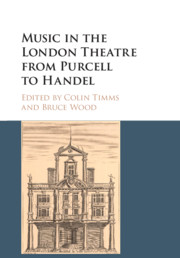Book contents
- Frontmatter
- Contents
- List of Figures
- List of Music Examples
- Notes on Contributors
- Preface
- Introduction
- I FROM PURCELL TO HANDEL
- 1 Purcell's ‘Scurvy’ Poets
- 2 Opera as Literature and the Triumph of Music
- 3 The British Enchanters and George Granville's Theory of Opera
- 4 Lost Chances: Obstacles to English Opera for Purcell and Handel
- 5 Alexander's Feast, or The Power of Perseverance: Dryden's Plan for English Opera and its Near-fulfilment in a Handel Ode
- II HANDEL AND ITALIAN OPERA
- III HANDEL AND ENGLISH WORKS IN THE THEATRE
- Bibliography
- Index
1 - Purcell's ‘Scurvy’ Poets
from I - FROM PURCELL TO HANDEL
Published online by Cambridge University Press: 10 June 2017
- Frontmatter
- Contents
- List of Figures
- List of Music Examples
- Notes on Contributors
- Preface
- Introduction
- I FROM PURCELL TO HANDEL
- 1 Purcell's ‘Scurvy’ Poets
- 2 Opera as Literature and the Triumph of Music
- 3 The British Enchanters and George Granville's Theory of Opera
- 4 Lost Chances: Obstacles to English Opera for Purcell and Handel
- 5 Alexander's Feast, or The Power of Perseverance: Dryden's Plan for English Opera and its Near-fulfilment in a Handel Ode
- II HANDEL AND ITALIAN OPERA
- III HANDEL AND ENGLISH WORKS IN THE THEATRE
- Bibliography
- Index
Summary
High style, low style: one of Purcell and his colleagues’ strengths in writing for the theatre in the 1680s and 90s was the creation of vivid effects by juxtaposing the two. Think of the contrast between the Trojan Sailor's jaunty song and the surrounding music of the Enchantresses in the last act of Dido and Aeneas, or between the Harvesters’ hoe-down and the minuet for the epiphany of Venus that follows it in King Arthur's Act V masque. Something similar happens in the first act of The Fairy Queen. Forest fairies are entertaining Titania and her Changeling Boy with a delicate masque of rural retreat when suddenly three earthlings blunder in, one of them – he has a bad stammer – singing drunkenly. The Fairies capture the lubbers, blindfold the vocal one and dance tauntingly around him. He soon finds himself pinched black and blue from top to toe and forced by his tormentors to give an account of himself:
POET. Hold, you damn'd tormenting Punk,
I confess —
BOTH FAIRIES. What, what, &c.
POET. I'm Drunk, as I live Boys, Drunk.
BOTH FAIRIES. What art thou, speak?
POET. If you will know it,
I am a scurvy Poet.
FAIRIES. Pinch him, pinch him for his Crimes, His Nonsence, and his Dogrel Rhymes.
POET. Oh! oh! oh!
1 FAIRY. Confess more, more.
POET. I confess I'm very poor.
As it happens, Purcell's juxtaposition of high musical style for the Fairies and low for the Poet is complemented in this scene by the bringing together of two theatrical strands: one thematic in a broad way, the other local and immediate. The fact that it is a poet who gets caught in the fairy ring chimes with the overall concern of The Fairy Queen – as of its parent play, A Midsummer Night's Dream – with things ‘fancy’-led: lunacy (in the sense of being in the thrall of moon-spirits), love and poetry. But at the same time it is germane that the particular poet the fairies torment is one who stammers, can sing after a fashion, writes nonsensical doggerel, will do you a verse-tribute to order, is strapped for cash and has ambitions to be Poet Laureate:
And as I hope to wear the Bays,
I'll write a Sonnet in thy Praise.
- Type
- Chapter
- Information
- Music in the London Theatre from Purcell to Handel , pp. 7 - 24Publisher: Cambridge University PressPrint publication year: 2017

